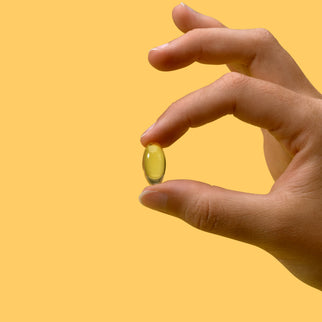At iwi life, we know you want the best for your baby when you’re pregnant. Maybe you’ve started doing daily walks or a little light exercise. Maybe you’ve tried yoga and worked hard to have a well-balanced diet.
There are lots of ways to help your baby grow, but one of the best ways you can do that is through prenatal vitamins to help your body get the minerals, nutrients, and vitamins it needs.
One nutrient that can be overlooked in supplements and prenatal vitamins is DHA. We have compiled a list of information about the importance of this omega-3, the important role it has for you and your developing baby, and the benefits of taking prenatal DHA.
What Are Omega-3s?
Omega-3s are a family of important fats you should try to consume daily. They play critical roles in helping to support your body’s functions for optimal health.
Each of the omega-3s helps carry out specific roles in your body and can be found in different sources of foods:
- Alpha-linolenic acid (ALA)
- Eicosapentaenoic acid (EPA)
- Docosahexaenoic acid (DHA)
Omega-3s have a wide range of health benefits. Maintaining proper levels of omega-3s can help support healthy blood pressure, healthy triglyceride levels, vision, brain health, and more., support your vision, support your brain health, and more.
What Is DHA?

Docosahexaenoic acid (DHA) is an omega-3 fatty acid that plays a critical role in the cells in your body. More specifically, certain body parts like your brain, skin, and eyes rely on DHA levels so they can function as best as they can.
Since your body can’t make DHA on its own, your body needs all the help it can get to have enough DHA. That means it has to come through the food you eat and supplements for additional support.
Where Can You Get Omega-3s?
The easiest way to increase your omega-3 levels is through your diet. Here are some ways you can incorporate some foods that naturally contain different omega-3s.
ALA
ALA is found mainly in plant oils such as flaxseed, soybeans, and canola oil. Flaxseed is the richest source of ALA, but it is also found in walnuts and red and black currant seeds. It's important to note, especially if you follow a plant-based diet, that ALA is really more of a precursor to what we think of as true omega-3. Your body needs to convert ALA found in plants into DHA and then EPA, and most researchers believe that only about 17% of ALA gets converted.
EPA
EPA is similar to DHA and is found in fish and other seafood. It’s found in cold-water fatty fish like salmon, tuna, mackerel, sardines, shellfish, anchovies, and herring. What many people don't realize is that fish don't make EPA themselves… they get it by eating krill, who get it from eating algae. Even having "borrowed" the EPA from the original source, these types of fish are still a rich natural source of this valuable omega-3 fat.
DHA
DHA is mainly found in seafood like fish, shellfish, and algae. The best sources are mackerel, salmon, herring, sardines, and caviar. Like EPA, DHA in fish isn't made by the fish themselves, but came from algae. Most of us don't eat algae, so we usually opt for fish or shellfish.
But what if you don’t want to eat fish every day? This can be hard for vegans and vegetarians, those who don’t tolerate fish well, have an allergy, or simply don’t like the taste.
That’s why supplements can be a good choice, especially ours which are made with algae oil. You don’t have to worry about the fishy aftertaste or sacrifice your dietary habits to achieve your wellness goals.
What Are Prenatal Vitamins?
You’ve probably come across the term prenatal vitamins. Prenatal vitamins are vitamin and mineral supplements that you take before, during, and after your pregnancy.
Depending on the ingredients in prenatal vitamins, they can help with a range of different developments for your baby, such as their teeth, bones, brain, and spine.
Prenatal vitamins are essential in making sure your baby gets the nutrients they need and helping support a healthy pregnancy.
Why Is DHA Important in Pregnancy?

DHA is very important during pregnancy because it can help your baby grow. Essentially, DHA plays a couple of key roles in helping support your baby’s:
- Brain development
- Eye development
- Nervous system development
1. DHA Helps Support Yours and Your Baby’s Body
DHA can play a critical role in your baby’s overall development, from their eyes to their brain and even their nervous system. If you’re looking for an ingredient in a prenatal vitamin that can support your baby’s overall health, look no further than DHA.
2. DHA Supports Full-Term Pregnancy
DHA intake during your pregnancy may support a full-term birth, paving the way for a safe and healthy pregnancy for you and your baby.
3. DHA Supports Your Baby’s Brain and Eyes During Pregnancy
Since omega-3s, like DHA and EPA, are building blocks to your baby’s brain and retina, your baby will utilize DHA during the second trimester of your pregnancy until they’re two.
If you choose to breastfeed, taking supplements with DHA while you’re breastfeeding can be really beneficial for your baby. Many forms of baby formula contain varying levels of DHA, so it is best to consult your doctor for advice about DHA supplements if you are formula-feeding your baby.
4. DHA May Support Your Baby’s Birth Weight
Some studies have shown that taking DHA during pregnancy may help support your baby’s birth weight by working to support their overall healthy growth and development.
5. DHA Linked to Improvements in Infant Response to Stress
One small study of infants living in urban, low-income areas showed better one-minute Apgar scores, higher birth weight, and better infant response to prenatal stress when their moms had an adequate source of DHA.
6. Support Your Overall Well-Being
Not only does consuming DHA during pregnancy help your baby, but it can also help you. Research suggests that DHA has the potential to support healthy emotions postpartum.
Even More Benefits From DHA
Here are some other ways DHA can help your baby during pregnancy:
- Essential for each trimester of your pregnancy since your baby’s brain rapidly develops every day
- It’s considered crucial in the first trimester when your baby’s brain and spinal cord are developing
- DHA supports the development of your baby’s cerebrum, which is responsible for thinking, remembering, and feeling
- It also supports the development of your baby’s cerebellum, which is responsible for all motor control
- It also helps develops your baby’s lungs, heart, and blood pressure
- DHA also supports your own eyes, brain, and skin even though they have finished developing.
As you can tell, there’s a wide range of benefits that come from just DHA. What’s not to love? That’s why we made DHA readily available in our algae omega-3 supplements.
How Much DHA Should You Take?

So, now you know about some of the great benefits DHA has to offer for you and your baby. But how much should you take?
Most health organizations recommend a lower amount of DHA, around 200 milligrams, even though there's evidence to suggest that a higher amount offers more benefits. The average intake recommended ranges from 200 milligrams to 1,000 milligrams daily.
There are known long-term side effects of decreased DHA intake during your pregnancy. Although research is limited regarding pregnant women, research suggests that decreased DHA during pregnancy may compromise your baby’s growth.
Evidence suggests that there aren’t benefits found in taking more than 1,000 milligrams a day. There isn’t enough evidence to suggest if there are any risks to taking too much.
Should You Take Prenatal Vitamins With DHA?
So, should you take prenatal vitamins with DHA?
The short answer is yes! DHA is safe in prenatal supplements, especially because omega-3 nutrients are so key for your and your baby’s health. It’s vital to help keep you and your baby free of DHA deficiency.
Do Your Prenatal Vitamins Have To Contain DHA?
DHA supplements could make a good addition to your prenatal vitamins. Check in with your healthcare provider before taking additional supplements if you have any questions or concerns.
Prenatal vitamins do not always contain DHA, so it’s up to you how you want to incorporate it into your diet. Luckily, iwi life provides both DHA supplements and prenatal vitamins in an easy-to-swallow format.
In fact, we have a whole range of supplements that can help support a variety of your wellness goals. Whether you aim to maintain your brain or eye health, are seeking to include omega-3s in your diet, or are looking to support your cholesterol, iwi life has options.
iwi life Algae Omega-3 Supplements
What’s not to love about DHA? There are plenty of reasons to include this essential fatty acid in your diet, whether you are pregnant, breastfeeding, or beyond to help support your body and your baby’s.
Want to know more? Check out our page with different algae omega-3 supplements that are designed with your health in mind.
Here’s why we think you should make our algae omega-3 supplements a part of your daily routine:
- Our DHA supplement contains 500 milligrams of DHA so that you know you’re getting the levels you need for you and your baby.
- Our prenatal vitamin contains a whole host of vitamins and 200 milligrams of DHA (in addition to EPA, omega-6, 7, and 9s, calcium, iron, and a variety of other nutrients)
- We use algae oil, rather than fish or krill oil. Why? We care about your health and the health of the planet. If you don’t like the taste of fish, are a vegetarian, or looking to ditch the fishy aftertaste, this could be a great alternative. We don’t want to contribute to overfishing and the ecosystem harm that goes with it. We are dedicated to sustainable farming methods, and we use a unique and patented form of algae called Almega®PL, which is clinically proven to help your body absorb 50% more omega-3s.
- We add other beneficial nutrients to help support your health.
Check out our page for a variety of different supplements developed to help maintain or support your cholesterol, brain, eyes, or DHA and EPA levels.
Better Living Starts With iwi Life
We know how much is on your plate when it comes to making sure your baby gets the nutrients they need. It doesn’t have to be complicated. Get a great head start with the right prenatal vitamins and DHA supplements.
Our algae omega-3 supplements can make a great addition to your healthcare plan in supporting the health of both you and your baby.
Whether you’re looking for a prenatal vitamin, a DHA supplement, or ways to increase your health and achieve your wellness goals, we have something for everyone.
Better living starts now, and it’s easier than ever. Ready to have the healthy pregnancy you deserve? Take a look at our current product offers for ways to help maintain your healthy body during pregnancy and in the years to come.
Sources:
Omega-3 Fatty Acid Supplementation During Pregnancy | PMC
Health benefits of docosahexaenoic acid (DHA) | PubMed



















